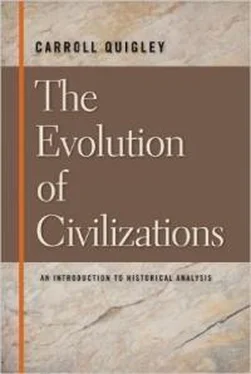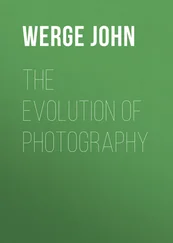This change has been recognized in popular discussion and carried, perhaps, to a degree not justified by the actual facts. We are told that we now live in a "two-power world," although the power of the United States and of the Soviet Union is not in fact hemispherical. Each of these superpowers can, it is true, obtain obedience in most matters over about forty percent of the earth's surface, but this leaves a buffer area between, amounting to about a fifth of the earth. This "buffer fringe" lying between the Soviet "heartland" and the peripheral, and ocean-linked, Western civilization is occupied by the shattered remnants of dying civilizations or the hopeful efforts of incipient new civilizations. The hope of the future does not rest, as commonly believed, in winning the peoples of the "buffer fringe" to one superpower or the other, but rather in the invention of new weapons and new tactics that will be so cheap to obtain and so easy to use that they will increase the effectiveness of guerrilla warfare so greatly that the employment of our present weapons of mass destruction will become futile and, on this basis, there can be a revival of democracy and of political decentralization in all three parts of our present world. This possible development in military and political matters would, of course, require the development of decentralized economic techniques such as could arise if sunlight became the chief energy source for production and the advance of science made it possible to manufacture any desired substance by molecular rearrangement of such common materials as sea water, plant fibers, and ordinary earth.
Hopes such as these are far in the future and could be fulfilled only if (1) a showdown conflict between the Soviet bloc and the Western bloc is indefinitely postponed and (2) the structural problems of Western civilization and the no less critical problems of the Soviet Union are solved. Here we shall consider only the situation in our own society.
The third Age of Expansion of Western civilization began to draw to its close at the end of the nineteenth century. By 1890 the rate of general expansion had begun to decrease, giving rise to acute crises in industry, agriculture, labor relations, political action, and international relations. These crises culminated in the beginnings of a new, third Age of Conflict in Western civilization.
8. Third Age of Conflict
The third Age of Conflict of our society began to display the ordinary marks of such a stage about 1890. At that time, in the principal industrial countries it became clear that the rate of expansion had reversed itself. This led to a frenzied effort by businessmen to organize in cartels and trade associations in order to keep prices above competitive levels and to share shrinking markets rather than to compete, as formerly, for new ones. Along with this went loud demands for tariff protection and all kinds of restrictive agreements, tacit or explicit, restricting new investment or entry of new enterprises into an activity. Increased pressure was put on governments to favor industrialists, and business organizations were formed to fight labor demands for any larger share of the goods being produced.
At the same time, labor and agriculture were reacting in a similar fashion, forming political pressure groups or even political parties, and seeking common action to raise prices, divide markets, exclude foreign competition, and to strike back at organized industry, finance, or transportation.
While these activities were occurring as symptoms for the usual decline in the rate of expansion and of the growing class conflicts associated with an Age of Conflict, the other marks of such a period were no less obvious. Imperialist wars developed from epidemic to endemic status in our culture, beginning perhaps with the Boer War and the Spanish-American War, but rapidly expanding into a cycle of international stress and crises in which we still live. At the same time, on the intellectual level occurred a great upsurging of irrationality. This latter development is associated with the eager acceptance of the theories of men like Freud, Bergson, or Sorel, and culminated in the utterly irrational activism of Hitler, Mussolini, and many lesser persons. All the characteristics of an age of irrationality began to appear on all sides—increased gambling, increased smoking, the growing use of alcohol and narcotics, a growing obsession with sex and with perversions of sex, an increasing mania for speed, for nervous tension, and for noise; above all, perhaps, a growing tendency to regard violence as a solution for all problems, be they domestic, social, economic, ideological, or international. In fact, violence as a symbol of our growing irrationality has had an increasing role in activity for its own sake, when no possible justification could be made that the activity was seeking to solve a problem.
All these characteristics of any Age of Conflict are too obvious to require further comment. They arose, as is usual in an Age of Conflict, because the organizational patterns of our culture ceased to function as instruments but had become institutionalized. This process was evident on all levels of culture. Religious organizations no longer linked men to God but adopted diverse mundane purposes. Our intellectual theories no longer explained anything or made us at home in the universe. Our social patterns no longer satisfied our gregarious needs, even when we fled from the lonely anonymity of the city to the rat-race uniformity of suburbanism. Our political organizations increased the burden of their demands on our time, energy, and wealth but provided with growing ineffectiveness the justice, public order, education, protection, or incidental amenities we had come to expect from them. And, on the military level, costs rose at an astronomical rate without being able to catch up with our increasing danger.
The core of our problems could be placed in any one of the levels we have mentioned. Indeed, there might be good grounds for arguing that the root of our problem was our success in making life an end rather than a means to something higher. But, in this civilization as in others, it will be convenient to discuss the problem of our Age of Conflict in terms of the institutionalization of our instrument of expansion.
In an earlier chapter we discussed this phenomenon as an example of the process in general (chapter five). At that time, we said that the economic organization had become institutionalized by taking on purposes of its own separate from the purposes of the organization as a whole. The purpose of any economic system is to produce, distribute, and consume goods. If it can do this at an increasing rate (within limits), so much the better. Our economic system performed these functions more effectively than any other in history by organizing itself around "a profit motivation within a price structure." As it became institutionalized, profits became an end in themselves to the jeopardy of production, distribution, and consumption. The change arose because profits could be maximized only by increasing the margin between selling prices and costs of production. But high selling prices and high profit margins with low costs of production tended to reduce consumption of goods. And low consumption of goods, at a time when production figures were constantly setting new maximum records, could only result in rising inventories and an indigestion of distribution that was bound to make goods back up to the factories to smother production.
This situation arose from a number of factors. During the nineteenth century, production had been emphasized in such a way as to distort the economic system as a whole, since such a system must also include distribution and consumption. Moreover, within the productive system the pursuit of profits had been emphasized to the neglect of any of the other necessary parts of the productive process. Put briefly, profits had become an end rather than a means. One consequence of this failure in coordination of the economic system as a whole and the even greater failure to coordinate the economic system in the civilization as a whole had been the growth of a very inequitable distribution of the wealth produced by the economic system. Such an inequitable distribution of wealth was a very excellent thing as long as lack of capital was prevalent in the economic system, but such a maldistribution of income ceases to be an advantage as soon as the productive system has developed out of all proportion to the processes of distribution and of consumption. In the United States, according to the National Industrial Conference Board, the richest one-fifth of our population received 46.2 percent of the national income in 1910, 51.3 percent of it in 1929, and 48.5 percent in 1937. In the same three years, the share of the poorest one-fifth of the population fell from 8.3 percent to 5.4 percent to 3.6 percent. Thus the ratios between the portion obtained by the richest one-fifth and that obtained by the poorest one-fifth increased in the three years mentioned from 5.6 to 9.3 to 13.5. If, instead of one-fifth, we examine the ratios between the percentage obtained by the richest one-tenth and the poorest one-tenth in the same three years we find that this ratio was 10 in 1910, was 21.7 in 1929, and reached 34.4 in 1937. To some extent this situation was made worse by the growing separation, in the more advanced industrial areas, between ownership and control of corporations, since this led to an increased accumulation of undistributed profits held by the corporations in control of the management rather than distributed as dividends to the owners. Such undistributed profits became savings with no possibility of serving as consumer purchasing power.
Читать дальше










